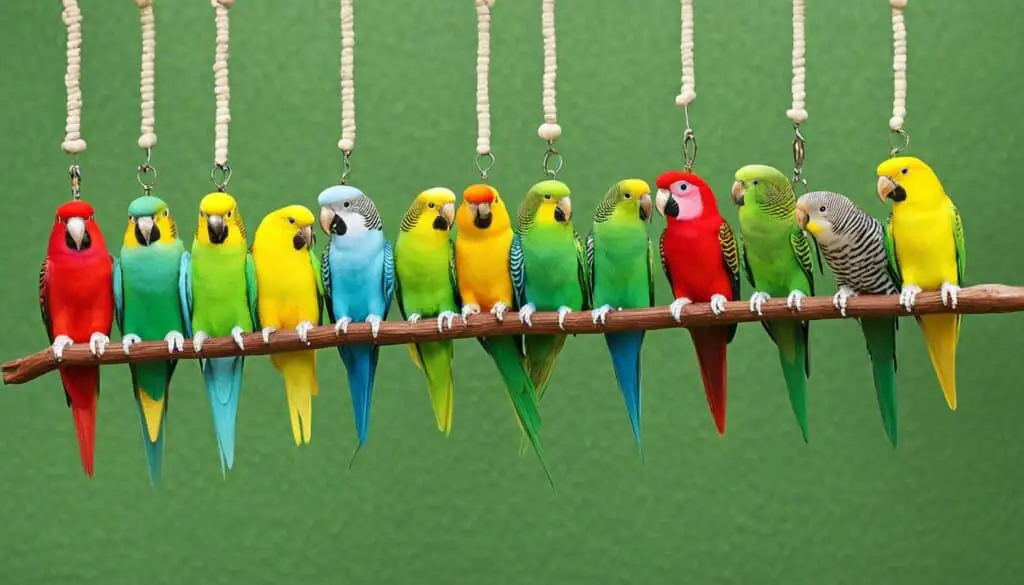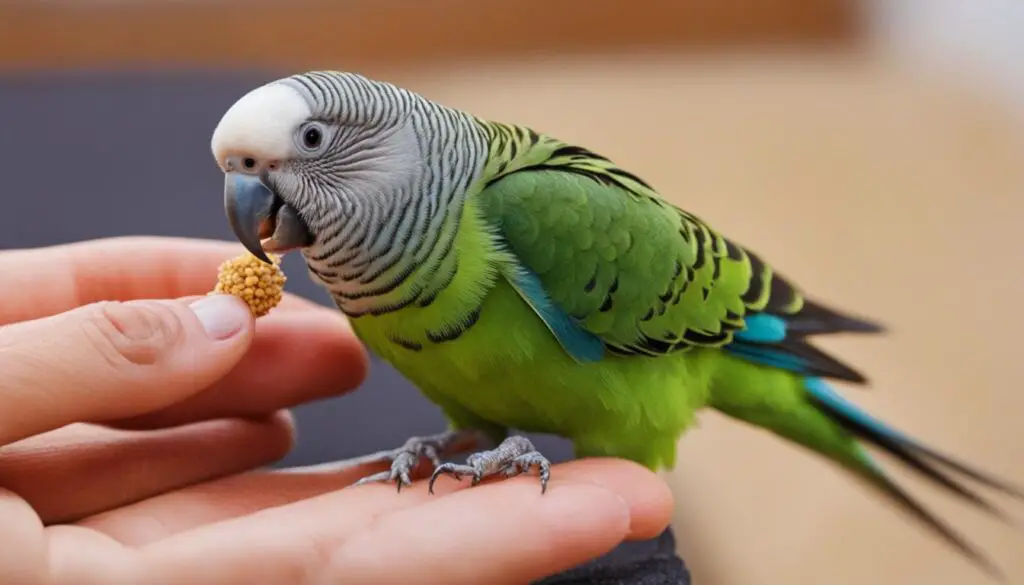The Essentials of Socializing Young Parakeets

Socializing young parakeets is crucial for ensuring they become friendly, well-adjusted pets. By following key techniques, you can build a strong bond with your parakeet and help them develop positive behaviors. In this article, I will explore the essentials of socializing young parakeets and provide tips for effective bonding and training.
Key Takeaways:
- Socializing young parakeets is important for creating friendly and well-adjusted pets.
- Early socialization plays a vital role in shaping parakeet behavior.
- Creating a safe and stimulating environment with appropriate toys is essential.
- Slow and gentle introductions help build trust with your parakeet.
- Regular social interactions and supervised playtime are beneficial for parakeet companionship.
Understanding the Importance of Early Socialization
Early socialization is a crucial aspect of raising a well-behaved and friendly parakeet. During their early stages of development, young parakeets are highly impressionable and receptive to learning. By exposing them to a variety of positive experiences, we can shape their behavior and ensure they grow up to be confident and sociable birds.
Positive interactions during this critical period play a vital role in building trust and establishing a strong bond between parakeets and humans. When introduced to a gentle and nurturing environment, parakeets learn to associate humans with safety and care. They become comfortable with human presence and are more open to forming positive relationships.
Early socialization also helps young parakeets become familiar with their surroundings. By gradually exposing them to different sights, sounds, and even other pets, they develop a sense of confidence and adaptability. This exposure prepares them to handle new experiences with ease as they grow older.
“Early socialization helps young parakeets become familiar with their surroundings and build positive relationships with humans.”
One way to promote early socialization is through positive interactions. Spending quality time with your parakeet, talking to them softly, and offering treats can create a positive association with human presence. This sets the foundation for trust and strengthens the bond between you and your feathered friend.
Table: Early Socialization Checklist
| Key Aspects | Actions to Take |
|---|---|
| Handling | Gently hold your parakeet, allowing them to become accustomed to being touched. |
| Socialization | Expose your parakeet to different people, including family members and friends, to ensure they are comfortable with various individuals. |
| Environment | Introduce new toys and perches regularly to stimulate their curiosity and prevent boredom. |
| Sounds | Expose your parakeet to a variety of sounds, such as music and household noises, to familiarize them with different auditory stimuli. |
Remember, early socialization sets the stage for a lifetime of positive interactions and healthy behaviors. By devoting time and attention to socializing your feathered friend during their early stages of development, you can establish a strong foundation for a friendly and well-adjusted adult parakeet.
Creating a Safe and Stimulating Environment
When it comes to socializing young parakeets, creating a safe and stimulating environment is paramount. Providing a secure and enriching space for your feathered friend allows them to thrive and develop positive behaviors. Here are some essential tips to ensure that your parakeet’s environment is both safe and stimulating:
“A safe and stimulating environment is crucial for the overall well-being of your parakeet.”
Securing the Cage
Start by carefully examining your parakeet’s cage to eliminate any potential hazards. Ensure that the cage bars are the appropriate distance apart to prevent your parakeet from escaping or injuring itself. Regularly check for any loose or sharp edges that could potentially harm your pet. Additionally, place the cage in a location where it is protected from extreme temperature fluctuations, direct sunlight, and drafts.
Providing Proper Perches
Offering a variety of perches in your parakeet’s cage is essential for their foot health and mental stimulation. Opt for natural wooden perches with varying diameters to exercise their feet and prevent pressure sores. Consider adding a cozy rope perch or a heated perch for extra comfort during colder months. Remember to position the perches at different heights to encourage your parakeet’s natural instinct to climb and explore.
Engaging Toys for Mental and Physical Stimulation
Parakeets are intelligent and active birds that require mental and physical stimulation to thrive. Make sure to include a range of parakeet toys in their environment to keep them entertained and prevent boredom. Offer toys that stimulate their natural behaviors, such as bells for auditory stimulation, swings for physical exercise, and chewable items to satisfy their natural urge to gnaw. Regularly rotate the toys to keep your parakeet engaged and prevent monotony.

Establishing a Routine
Parakeets thrive on routine, so try to establish a consistent daily schedule for feeding, cleaning, and social interaction. This regularity provides a sense of security and helps your parakeet feel more comfortable in their environment. Set aside specific playtimes where you can interact with your parakeet, allowing them to explore outside the cage in a safe and supervised space. Remember to be patient and gradually introduce new experiences to avoid overwhelming your feathered friend.
Cleanliness and Hygiene
Maintaining cleanliness in your parakeet’s environment is essential for their health and well-being. Regularly clean their cage, perches, and toys to prevent the buildup of bacteria or fungi. Provide fresh water and a balanced diet to ensure optimal health. Additionally, avoid using toxic household cleaning products near your parakeet’s cage, as their respiratory systems are highly sensitive.
| Benefits of a Safe and Stimulating Environment: |
|---|
| – Promotes physical and mental well-being |
| – Prevents boredom and destructive behavior |
| – Encourages natural instincts and behaviors |
| – Builds trust and a positive relationship with your parakeet |
Remember, creating a safe and stimulating environment for your parakeet is not only important for their happiness but also for their long-term health. By providing a secure cage, proper perches, engaging toys, and establishing a routine, you are setting the foundation for a fulfilling and joyous life for your feathered friend.
Slow and Gentle Introductions
When it comes to introducing yourself to a young parakeet, taking a slow and gentle approach is key. Rushing the process can lead to fear and anxiety, hindering the development of a strong bond. Instead, follow these steps for successful introductions:
- Start by positioning yourself near the parakeet’s cage and speaking softly in a calm tone. This allows the parakeet to get accustomed to your presence and become comfortable.
- Progress gradually by offering treats from your hand. Place the treat near the cage opening and allow the parakeet to approach and take it at their own pace. This helps build trust and positive associations with your presence.
- Once the parakeet is comfortable taking treats from your hand, you can gently extend your hand further into the cage. Avoid sudden movements and be patient as the parakeet adjusts to this new level of interaction.
- Hand training using positive reinforcement techniques can further strengthen the bond between you and your parakeet. Consider clicker training or target training as effective methods for teaching basic commands and encouraging desired behaviors. Remember to reward your parakeet with treats or verbal praise when they respond correctly.
Remember, every parakeet is unique, and the timeline for building trust will vary. Be patient, observe their cues, and adjust your approach accordingly. Consistency, gentle interactions, and positive reinforcement will help create a strong foundation for a trusting relationship with your parakeet.
Encouraging Social Interactions
Parakeets are highly social birds and thrive on regular social interactions. These interactions are essential for their mental and emotional well-being. One way to provide social companionship for your parakeet is by considering the introduction of another parakeet to the household. Having a parakeet companion can help alleviate their loneliness and promote a sense of belonging.
However, it is crucial to monitor the interactions between the parakeets to ensure they get along well. Each bird has its unique personality, and compatibility may vary. It’s important to introduce the parakeets slowly and supervise their initial interactions to determine if they are compatible companions.
Additionally, providing supervised playtime outside the cage is another excellent opportunity for social interactions between you and your parakeet. It allows them to spread their wings, explore their surroundings, and bond with you in a safe environment. During playtime, ensure that the area is parakeet-proofed, free of potential hazards, and under your watchful supervision.
Remember to interact and engage with your parakeet during playtime, using toys and games suitable for their enjoyment. This quality time outside the cage not only provides opportunities for socialization but also helps in building trust and strengthening the bond between you and your parakeet.
Benefits of Social Interactions for Parakeets
- Enhances their social skills and behavior
- Reduces feelings of loneliness and boredom
- Promotes mental stimulation and prevents behavioral issues
- Strengthens the bond between you and your parakeet
- Creates a happier and healthier environment for your parakeet
By encouraging social interactions and providing parakeet companionship, along with supervised playtime, you can ensure that your feathered friend leads a fulfilling and enriched life.
| Benefits | Details |
|---|---|
| Enhances social development | Parakeets learn proper social cues and behaviors by interacting with others of their kind. |
| Reduces stress and anxiety | Regular social interactions alleviate feelings of loneliness and promote a sense of security. |
| Provides mental and physical stimulation | Parakeets engage in play and exercise during social interactions, which helps prevent boredom and maintain overall well-being. |
| Stimulates vocalization and mimicry | Parakeets learn by observing and imitating their feathered companions, leading to enhanced vocal abilities and mimicry. |
Consistency and Patience in Training
When it comes to training young parakeets, consistency and patience are the keys to success. By using positive reinforcement techniques and maintaining a consistent approach, you can effectively teach your parakeet commands and behaviors. Although it may take time for them to fully grasp and respond to your training, it’s important to remain patient and persistent.
During the training process, celebrate your parakeet’s successes and provide them with rewards when they exhibit the desired behaviors. This positive reinforcement helps reinforce their learning and encourages them to continue their training journey. Whether it’s a tasty treat or verbal praise, rewarding your parakeet for their accomplishments creates a positive association with the desired behaviors.
“Training young parakeets requires a calm and patient approach. By consistently reinforcing positive behaviors and utilizing rewards, you can build a strong bond with your parakeet while teaching them essential commands.”
Remember, each parakeet is unique, and the learning process may vary from bird to bird. Stay committed to their training, offering guidance and support as they navigate through the learning curve. With time and dedication, your parakeet will become a well-trained and enjoyable companion.
Consistency and Patience Tips:
- Establish a regular training schedule to promote consistency.
- Be patient and understanding during the learning process.
- Break training sessions into shorter, more manageable segments.
- Use positive reinforcement, such as treats, praise, or favorite toys, to reward desired behaviors.
- Stay calm and avoid raising your voice or using punishment-based techniques.
- Adjust your training approach to accommodate your parakeet’s individual needs and preferences.
Building Trust through Daily Interaction
Establishing trust with your parakeet is a crucial step in creating a strong bond. Daily interaction and establishing routines are key elements in building this trust. Here are some effective strategies to help you foster trust and deepen your connection with your feathered friend.
Spending Quality Time Together
To build trust, it’s important to dedicate time each day to interact with your parakeet. This includes talking to them, offering treats, and engaging in gentle handling. Regular daily interaction will help your parakeet become familiar with your presence, voice, and scent.
Respecting Boundaries
It’s essential to be patient and respectful of your parakeet’s boundaries. If they show signs of discomfort or fear, it’s important to back off and give them space. Avoid forcing interactions and allow your parakeet to approach you on their own terms. Respecting their boundaries will help them feel safe and secure in your presence.
Establishing Routines
Creating a consistent routine can help your parakeet feel secure and establish a sense of predictability. This can include daily feeding, playtime, and training sessions. By following a schedule, your parakeet will come to expect and anticipate these activities, which can further strengthen the bond between you.
Showing Affection and Care
Expressing your affection and care for your parakeet is a vital part of building trust. Beyond regular interaction, you can show your love by providing a comfortable and stimulating environment. Ensure their cage is clean, well-maintained, and enriched with toys, perches, and other accessories. This demonstrates your commitment to their well-being and happiness.
“The most valuable thing you can give your parakeet is your time, patience, and understanding.”
Remember that building trust takes time and consistency. Every parakeet is unique, and some may take longer to develop trust than others. Stay committed to the process, and you will reap the rewards of a deep and trusting relationship with your feathered companion.
Now that you understand the importance of building trust through daily interaction, let’s move on to the next section where we will explore the benefits of social interactions and companionship for parakeets.
| Benefits of Building Trust through Daily Interaction | Strategies |
|---|---|
|
|

Conclusion
Socializing pet parakeets is an essential process for creating friendly and well-adjusted feathered companions. By understanding the importance of early socialization, creating a safe and stimulating environment, and using gentle and consistent training methods, you can establish a strong bond with your parakeet. Remember to provide daily interaction, encourage social interactions, and remain patient as you guide your parakeet towards becoming a happy and sociable member of your family.
Successful bonding starts with understanding the unique needs of your parakeet. By providing a friendly environment with a secure and engaging cage, you create a foundation for trust and positive experiences. Slow and gentle introductions, along with the use of positive reinforcement techniques like hand training, can help build a strong connection and establish desired behaviors.
Encouraging social interactions and companionship with other parakeets can further enhance your pet’s well-being. Supervised playtime outside the cage allows them to explore and interact in a controlled setting. Consistency and patience are key throughout the training process. By celebrating their successes and using reward-based training, you can reinforce positive behaviors and strengthen your bond.
Ultimately, the journey of socializing your pet parakeet is an ongoing commitment. By dedicating time and love to your parakeet daily, you can nurture their trust, establish routines, and create a harmonious environment where your parakeet can thrive. So, embrace the joys of socializing and enjoy the rewarding experience of having a well-socialized pet parakeet by your side.
FAQ
Why is socializing young parakeets important?
Socializing young parakeets is crucial for ensuring they become friendly, well-adjusted pets. It helps shape their behavior and allows them to become comfortable with humans and their surroundings.
How can I create a safe and stimulating environment for my parakeet?
To create a safe and stimulating environment for your parakeet, make sure their cage is secure and free from hazards. Include appropriate perches and toys for mental and physical stimulation, such as bells, swings, and chewable items.
How should I introduce myself to a young parakeet?
Slowly and calmly approach the parakeet. Start by sitting near their cage and talking softly to them. Gradually, offer treats from your hand to build trust. Hand training using positive reinforcement techniques like clicker training or target training can also help establish a bond.
Should I consider getting another parakeet for companionship?
Yes, introducing another parakeet can provide companionship. However, always monitor their interactions to ensure they get along. Additionally, supervised playtime outside the cage allows your parakeet to explore and interact with you in a safe environment.
How important is consistency and patience in training parakeets?
Consistency and patience are key when training parakeets. Use positive reinforcement techniques and be consistent with your training methods. Parakeets may take time to learn commands and behaviors, so remaining patient and persistent is important.
How can I build trust with my parakeet?
Daily interaction and establishing routines are essential for building trust with your parakeet. Spend time with them each day, talking to them, offering treats, and engaging in gentle handling. Be patient and respect their boundaries if they show signs of discomfort.
What are the benefits of socializing young parakeets?
Socializing young parakeets is rewarding and essential for creating friendly and well-adjusted pets. By understanding the importance of early socialization, creating a safe environment, and using gentle and consistent training methods, you can establish a strong bond with your parakeet.



